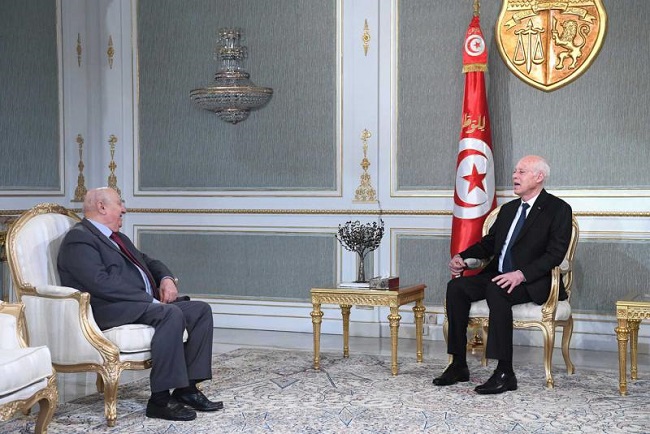President Kais Saied has made various actions that detractors claim are aimed to entrench him in power, and he appears increasingly unwilling to compromise as the political crisis in Tunisia continues to simmer on.
On Thursday, Saied voted against a proposed transitional government and national dialogue conference proposed by the opposition “National Salvation Front.”

Conversation With People Who Wish to Target the Tunisian State
Saied told a Tunisian gathering, “there is no conversation with people who wish to target the Tunisian state,” suggesting the opposition’s effort was an attempt to reach out to him.
This comes after a week in which Saied removed the majority of the members of the election commission (ISIE) on April 22, removing yet another democratic check on the president and raising concerns about the credibility of future elections.
Saied’s removal of the cabinet, suspension of parliament, and assumption of emergency powers nine months ago precipitated the current situation in Tunisia, which his opponents have called a “coup.”
The Tunisian people rose up in the 2011 Jasmine Revolution to protest the government’s failure to address widespread poverty, graft, and repression. Former Libyan leader Zine al-Abidine Ben Ali has announced his intention to step down in January 2011. The media dubbed the rebellion the “Jasmine Revolution,” and its success sparked a wave of protests across the Middle East and North Africa. This movement became known as the “Arab Spring.”
Protests
On December 17, a young Tunisian named Mohamed Bouazizi lit himself on fire outside of a municipal office in the town of Sidi Bouzid, located in the country’s central region. When local officials kept demanding payments from Bouazizi and took away the fruit he was selling to support his family, he became outraged.
He doused himself in gas and set himself on fire after authorities ignored his complaint. Protests against high unemployment, poverty, and political repression were sparked by his condition, which became emblematic of the plight of many Tunisians under the Ben Ali administration.
They seemed to have a lot of support among Tunisians who were sick of the political infighting and economic stagnation. Thousands flocked to the streets in joy, and the president basked in the self-assured knowledge that he had spoken for the people.
Last Words
Few specifics about policy proposals to address Tunisia’s primary economic challenges have been revealed in these films, but the president’s harsh rhetoric against his detractors and opponents has only served to fuel concerns that he pursues dictatorial aims. Thanks for reading our article Why Tunisias Promise of Democracy Struggles to Bear Fruit.


